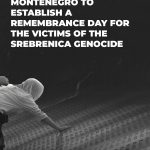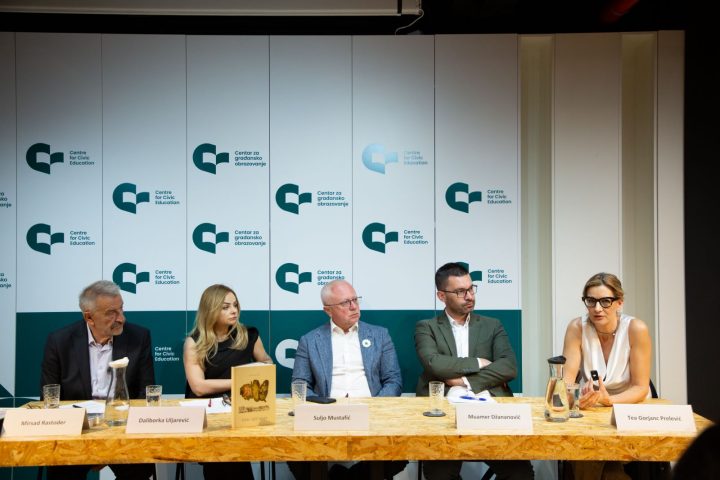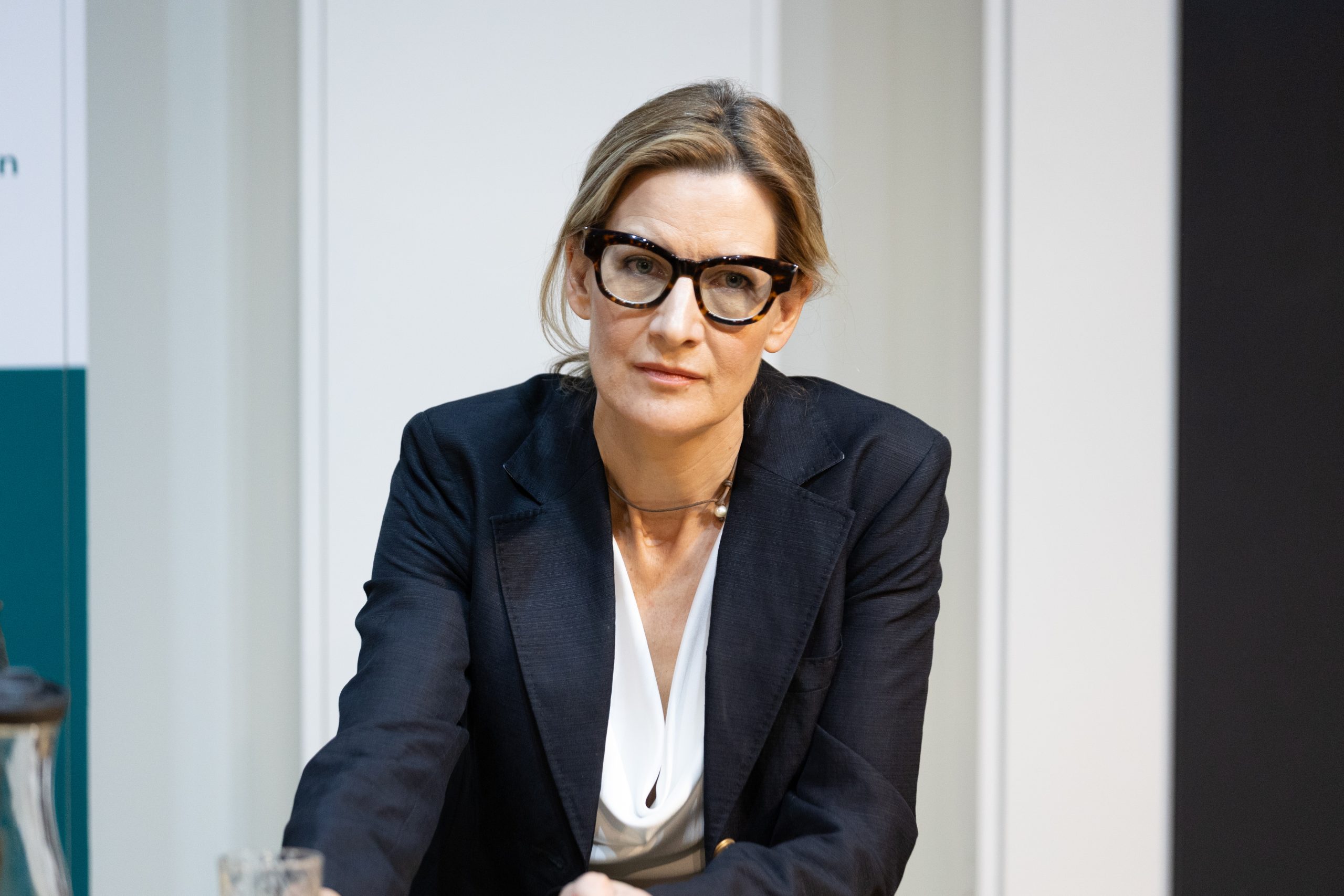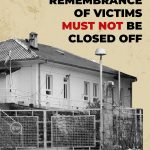
MONTENEGRO TO ESTABLISH A REMEMBRANCE DAY FOR THE VICTIMS OF THE SREBRENICA GENOCIDE
04/07/2025
TIME FOR A CLEAR DISTANCE FROM WAR CRIMINALS
06/07/2025SREBRENICA BETWEEN RESPONSIBLE REMEMBRANCE AND TARGETED DENIAL

Montenegro must establish a Day of Remembrance for the Srebrenica genocide and take a responsible stance toward the truth about this crime, which is a test of humanity and dignity for all of us. It is important to marginalize genocide deniers in the region – for the sake of the victims and the future of children in Montenegro and the entire region. A better society cannot be built on lies, relativization, and revisionism, was the message from the memorial panel “Srebrenica Between Responsible Remembrance and Targeted Denial”, held last night and organized by the Centre for Civic Education (CCE), the Bosniak Council in Montenegro, and Human Rights Action (HRA), as part of commemorating the 30th anniversary of the genocide in Srebrenica.
Dr Muamer Džananović, Director of the Institute for Research of Crimes (B&H), pointed to the ideological motives behind the mass campaign of crimes in B&H, particularly in Eastern Bosnia, where Srebrenica was one of the targets. He emphasized that in order to understand the reasons for the genocide in and around Srebrenica, one must analyze the entire period of crimes – from the beginning of 1992 until July 1995.
“Denial of the genocide began already during its execution and, unfortunately, continues to this day, with only brief pauses. The disclosure of facts about the mass executions and graves immediately after the fall of Srebrenica triggered a wave of concealment of the crime – relocating bodies, manipulating evidence, and creating a false image of reality. That process has not stopped; it has merely become more sophisticated”, he said.
Džananović stressed that the genocide in B&H was planned, systematic, and orchestrated from the political top. “Denial is a continuation of that same policy – a policy that seeks to erase the traces of the crime, belittle the victims, and prevent acknowledgment of the truth and the building of peace. The governments of Serbia and the Republika Srpska entity lead this effort and act in coordination”, he added.
“Montenegro supported the Srebrenica Resolution, but implementation is lacking. This shows how much work still lies ahead – especially since voices diminishing or denying the genocide are still heard in Montenegrin society, sending dangerous and wrong messages”, Džananović concluded.
Suljo Mustafić, President of the Bosniak Council in Montenegro, emphasized that memorializing the victims is not only an obligation toward the past but also the foundation for future coexistence and mutual respect.
“By adopting the Resolution last year, the UN General Assembly gave partial civilizational satisfaction to the mothers of Srebrenica. Montenegro supported that Resolution and showed that it is no longer on the wrong side of history, as it was until the mid-1990s, including during the time of Srebrenica. By doing so, Montenegro also committed to marking the International Day of Remembrance”, he noted.
He recalled that the Parliament of Montenegro had previously adopted two acts – the 2009 Declaration and the 2021 Resolution condemning the genocide in Srebrenica.
“Montenegro has pledged to condemn any denial of the Srebrenica genocide. We expect that the chapter on genocide will be included in the education system and that the judiciary will consistently prosecute those who glorify war criminals convicted by international courts for crimes and genocide in Srebrenica. Montenegrin state institutions must act as a barrier against ideologies that led to genocide, not as supporters or silent observers of the ideologies that sustained the criminal policies and expansionist agenda”, Mustafić stated.
Daliborka Uljarević, Executive Director of the CCE, emphasized that responsible remembrance is the duty of everyone, especially institutions.
“The genocide in Srebrenica is not just a dark page of history, but a test of our humanity and readiness to confront the truth – especially important as we witness the revival of ideologies that led to that crime. We face two realities: the truth, confirmed by the highest courts, and denial, which seeks to diminish, relativize, or justify the unthinkable. Responsible remembrance is not mere commemoration, but a process of confrontation and resistance to denial, in which the names and lives of 8,372 murdered men and boys must not become just statistics but a reminder to prevent such horrors from recurring”, she said.
She also highlighted the importance of politics, education, and media. “That is why we insist that politics stop bargaining with the truth, that the education system not remain silent about facts, and that the media not serve as platforms for deniers. One of the initiatives we launched is to revoke the award given to war criminal Radovan Karadžić”, she explained, adding that this is a moral minimum toward the victims and a society that seeks justice.
“If we want Montenegro to live up to its best values, especially the principles of honor and heroism, we must prove we can remember, acknowledge, and condemn crimes – without calculation, fear, or lies”, Uljarević concluded.
Tea Gorjanc Prelević, Executive Director of HRA, pointed out that denying genocide also means denying international justice and justice for the victims.
“The Hague Tribunal’s verdicts, which established responsibility for genocide and war crimes in Srebrenica, were based on testimonies from about 1,500 witnesses and 28,000 pieces of evidence. Trials involved 46 judges from 34 countries. More than 50 people were convicted for genocide and other crimes. The remains of victims were found in over 80 graves, only eight of which were primary, which shows the enormous effort to cover up the crime”, she recalled.
She added that the first Commission to investigate the events in Srebrenica, formed by the Republika Srpska entity government in 2004, determined that over 20,000 individuals took part in the genocide. “To claim all this was a fabrication is absurd and brazen, and it represents the final phase of genocide”, she emphasized.
She noted that citizens of Montenegro overwhelmingly recognize Srebrenica as the worst crime of the 1990s, despite some politicians denying it. “I agree with historian Dubravka Stojanović that this reflects a political need for a monopoly on victimhood status, supposedly to justify their own actions. That is why, after the UN Resolution on Srebrenica, there was pressure in Montenegro to adopt a Resolution on Jasenovac,” she explained.
Mirsad Rastoder, publicist and moderator of the panel, reminded of final judgments in Montenegro for crimes committed during the 1990s and emphasized the need for more consistent prosecution of crimes and education of young people.
He observed that Montenegro has for decades remained halfway between genuine confrontation with its past and targeted denial, without consistently implementing decisions and international obligations.
“It is high time for society to break away from the ideologies that led to the crimes, to confront its own role in the war, and to raise generations in whose hearts the words ‘Forgive us, Srebrenica’ will resonate. That is the best safeguard against a disguised past becoming the future of this country and the region,” said Rastoder, concluding that the truth about the genocide in Srebrenica and other crimes must be included in textbooks.
The organizers once again called on the relevant institutions in Montenegro to recognize their moral and legal obligation and establish a Day of Remembrance for the victims of the genocide in Srebrenica in the official calendar, and to stop tolerating the denial and glorification of war criminals.












 English
English